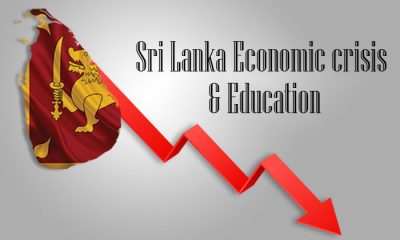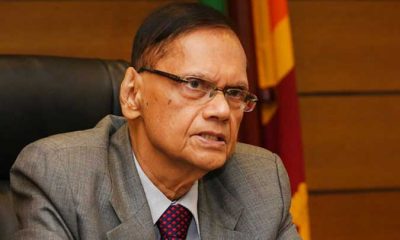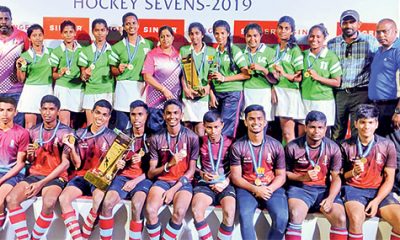News
Economic crisis: How trade misinvoicing contributed to Sri Lanka’s bankruptcy

Public interest group points finger at corrupt public-private partnership
By Shamindra Ferdinando
A group representing trade union and civil society collective on Tuesday (07) called for urgent action to tackle the well-organised influential public–private sector partnership engaged in ‘overinvoicing’ and ‘under invoicing, with the blessing of successive governments.
Addressing the media at the Centre for Society and Religion, Maradana, economic analyst Dhanusha Pathirana, civil society activist TharinduUduwaragedara and Attorney-at-Law Lakmali Hemachandra explained how ‘over invoicing’ and ‘under invoicing’ contributed to the economic crisis.
Pathirana asserted that a sharp reduction of capital, as a result of mispricing by importers, in respect of duty/tax free goods and taxable imports, was far more serious than the parking of funds overseas by exporters.
The group underscored the need to examine capital flows through four forms of trade mis-invoicing, namely import over-invoicing and under-invoicing and export over-invoicing and under-invoicing.
Opposition lawmakers Vasudeva Nanayakkara, Wimal Weerawansa and Gevindu Cumaratunga, in Parliament, estimated the stashed amount at over USD 35 bn. The trio has alleged that the Exchange Control Act No 12 of 2017, enacted during the Yahapalana administration allowed exporters to ‘park’ funds overseas.
Dr. Wijeyadasa Rajapakse, PC, has estimated as much as USD 53.5 bn had been ‘parked’ overseas. This claim was made during the committee stage debate on the Appropriation Bill last year.
Pathirana discussed the disclosures made by Global Financial Integrity (GFI), a Washington, DC-based think tank that examined illicit financial flows, corruption, illicit trade and money laundering, pertaining to Sri Lanka.
Commenting on statements made, both in and outside Parliament as regards parking of export proceedings, both Pathirana and Uduwaragedara emphasized that the country suffered much more losses due to capital outflows than ‘parking’ of export proceeds overseas.
They found fault with both importers and exporters, at different levels, and deceitful bureaucracy, that manipulated the entire process, for the benefit of a few, at the expense of the entire country. They stressed that such huge outflows couldn’t be caused by illegal money transferring schemes, such as ‘undial’ and ‘hawala.’
Referring to GFI findings that dealt with the 2009-2018 period, Pathirana, formerly of Asia Capital, stressed that the country lost as much as USD 40 bn due to over-invoicing and under-invoicing, in addition to parking of export proceeds, etc.
Secretary General of the Commercial and Industrial Workers Union, Arulingam Swasthika, didn’t join the discussion, as stated by the organizers.
At the onset of the briefing, Uduwaragedara pointed out that the Wickremesinghe-Rajapaksa government was on its knees before the International Monetary Fund (IMF) for USD 2.9 bn bailout package, whereas USD billions ,that could be utilized,remained overseas.
Sri Lanka has secured IMF bailout packages on 16 previous occasions.
The activist said that Justice Minister Wijeyadasa Rajapakse, PC, and Samagi Jana Balavegaya (SJB) heavyweight Patali Champika Ranawaka, in his capacity as the Chairman of the National Council sub-committee on identifying short- and medium-term programmes, related to economic stabilization, acknowledged the disclosures made by the GFI.
Cabinet spokesperson Bandula Gunawardena, too, admitted the issue at hand, though the government was yet to respond to this situation, Uduwaragedara said.
Actually, the government owed an explanation why, in spite of facing such extreme difficulties, those responsible for the revenue collection mechanisms, soft-pedal the issue.
“We are in a desperate situation. But, Parliament, responsible for public finance ,never really intervened in this matter. Parliament not only turned a blind eye to this daylight robbery but encouraged corruption at every level,” Uduwaragedara alleged.
Pathirana pointed out that even after President Gotabaya Rajapaksa’s government restricted imports, in 2021, the import bill remained high. “Our foreign reserves, amounting to USD 7.5 bn, simply evaporated as unscrupulous elements ,engaged in ‘over-invoicing,’ simply stepped up their operations,” Pathirana said.
According to him, even foreign loans, received by Sri Lanka, and foreign remittances, too, were vulnerable to these machinations. Both Pathirana and Uduwaragedara warned that unless remedial measures were taken to tackle corrupt cartels, the USD 2.9 bn received, over a period of four years, wouldn’t make a difference.
Pathirana emphasized that if the government was genuinely interested in breaking up the corrupt networks it could be done.
The public interest group urged the government to launch a comprehensive audit as part of the overall remedial measures. The Central Bank should intervene in this matter, without further delay, Pathirana said.
Uduwaragedara pointed out that those at the helm conveniently failed to act on the shocking disclosures made by Panama Papers (published beginning April, 2016) and Pandora Papers (2021). Referring to a spate of cases, involving Sri Lankans, that had been disclosed by Panama Papers and Pandora Papers, Uduwaragedara stressed that the failure on the part of the government to properly investigate, at least one case, exposed the bitter truth.
The media was told how those who had been exposed, invested in property overseas, ranging from luxury houses to art.
Stressing the urgent need and the responsibility on the part of the government to further strengthen laws to tackle these issues, Pathirana suggested that there should be a wider discussion, regarding writing off debt.
The Island
asked whether they really expected those responsible for the economic ruin here to genuinely address this issue, and anything tangible expected from those at the helm of power. Lawyer Lakmali Hemachandra said that they were still pursuing the issues and no final decision was taken on future course of action.
Pathirana said that Universities should engage in what he called an in-depth study of the growing problem. Referring to former Auditor General Gamini Wijesinghe’s declarations, pertaining to the ongoing crisis, Pathirana suggested that the government should commence an inquiry, beginning 2021.
The group said that this particular issue hadn’t received sufficient attention of the Sinhala media, both print and electronic, hence the need to make the public aware of the continuing threat. In spite of the Central Bank, in July 2006, responding to the threat posed by money laundering and terrorism financing, successive governments never really took concrete measures in that regard.
Towards the end of the discussion, the urgent need to introduce amendments to the Exchange Control Act No 12 of 2017, as part of Sri Lanka’s response to the continuing financial crisis was also taken up. Amendments were necessary to restore the authority exercised by the Central Bank in respect of regulation of foreign exchange, before the enactment of the above controversial piece of legislation by the Yahapalana government.
The group said that wider investigation was required to establish the truth, though the current crisis had been blamed on President Gotabaya Rajapaksa’s policy mismanagements, such as unprecedented tax cuts that caused the loss of revenue to the tune of Rs 600 bn.
News
US sports envoys to Lanka to champion youth development

The U.S. Embassy in Colombo welcomed the U.S. Sports Envoys to Sri Lanka, former National Basketball Association (NBA) and Women’s National Basketball Association (WNBA) players Stephen Howard and Astou Ndiaye, from June 8 through 14.
The Public Diplomacy section of the U.S. Embassy said that it would launch a weeklong basketball program intended to harness the unifying power of sports, made possible through collaboration with Foundation of Goodness and IImpact Hoop Lab.
While in Sri Lanka, Howard and Ndiaye, both retired professional basketball players, will conduct a weeklong program, Hoops for Hope: Bridging Borders through Basketball. The Sports Envoys will lead basketball clinics and exhibition matches and engage in leadership sessions in Colombo and Southern Province for youth aged 14-18 from Northern, Uva, Eastern and Western Provinces, offering skills and leadership training both on and off the court. The U.S. Envoys will also share their expertise with the Sri Lanka Basketball Federation, national coaches, and players, furthering the development of basketball in the country. Beyond the clinics, they will collaborate with Sri Lankan schoolchildren to take part in a community service project in the Colombo area.
“We are so proud to welcome Stephen and Astou as our Sports Envoys to Sri Lanka, to build on the strong people-to-people connections between the United States and Sri Lanka,” said U.S. Ambassador Julie Chung. “The lessons that will be shared by our Sports Envoys – communication, teamwork, resilience, inclusion, and conflict resolution – are essential for leadership development, community building, equality, and peace. The U.S. Sports Envoy program is a testament to our belief that sports can be a powerful tool in promoting peace and unity.”
News
Rahuman questions sudden cancellation of leave of CEB employees

SJB Colombo District MP Mujibur Rahuman in parliament demanded to know from the government the reasons for CEB suspending the leave of all its employees until further notice from Thursday.
MP Rahuman said that the CEB has got an acting General Manager anew and the latter yesterday morning issued a circular suspending leave of all CEB employees with immediate effect until further notice.
“We demand that Minister Kanchana Wijesekera should explain this to the House. This circular was issued while this debate on the new Electricity Amendment Bill was pending. There are many who oppose this Bill. The Minister must tell parliament the reason for the urge to cancel the leave of CEB employees,” the MP said.However, Speaker Mahinda Yapa Abeywardena prevented Minister Wijesekera responding to the query and said that the matter raised by MP Rahuman was not relevant.
News
CIPM successfully concludes 8th Annual Symposium

The Chartered Institute of Personnel Management (CIPM) successfully concluded the 8th Annual CIPM Symposium, which took place on 31st May 2024. Themed “Nurturing the Human Element—Redefining HRM in a Rapidly Changing World,” the symposium underscored the pivotal role of human resource management (HRM) in today’s dynamic global landscape. Since its inception in 1959, CIPM has been dedicated to advancing the HR profession through education, professional development, and advocacy, solidifying its position as Sri Lanka’s leading professional body for HRM.
Ken Vijayakumar, the President of the CIPM, graced the occasion as the chief guest. The symposium commenced with the welcome address by the Chairperson, Prof. Arosha Adikaram, followed by the Web Launch of the Symposium Proceedings and Abstract Book by the CIPM President. The event featured distinguished addresses, including a speech by Chief Guest Ken Vijayakumar, President of CIPM, and an address by Guest of Honor Shakthi Ranatunga, Chief Operating Officer of MAS Holdings Pvt. Ltd., Sri Lanka.
The symposium also featured an inspiring keynote address by Prof. Mario Fernando, Professor of Management and Director of the Centre for Cross Cultural Management (CCCM) at the University of Wollongong, Australia.
Vote of Thanks of the inauguration session was delivered by Dr. Dillanjani Weeratunga, Symposium Co-chair.
The symposium served as a comprehensive platform for researchers to present their findings across a wide range of critical topics in HRM. These included Cultural Diversity and Inclusion, Talent Development and Retention, Ethical Leadership and Corporate Social Responsibility, Adapting to Technological Advancements, Mental Health and Well-being at Work, Global Workforce Challenges, Employee Empowerment, and Reskilling and Upskilling.
The plenary session was led by Prof. Wasantha Rajapakse. Certificates were awarded to the best paper presenters during the valedictory session, followed by a vote of thanks delivered by Kamani Perera, Manager of Research and Development.
The annual symposium of CIPM was a truly inclusive event, attracting a diverse audience that spanned undergraduates, graduates, working professionals, research scholars and lecturers. This widespread interest highlights the symposium’s significance in the field of HRM, offering a unique opportunity for everyone to network and learn from scholarly brains.The CIPM International Research Symposium was sponsored by Hambantota International Port, Sri Lanka Institute of Information Technology (SLIIT), E B Creasy & Co. PLC, and Print Xcel Company.






















